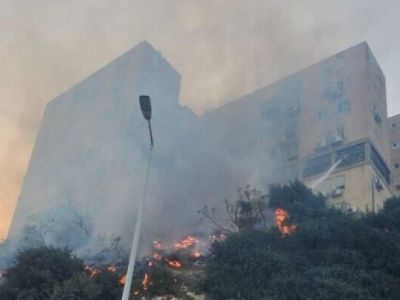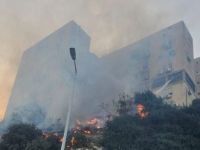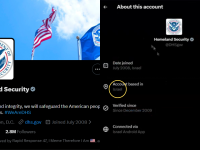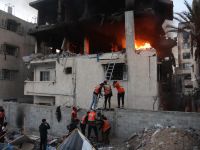Palestinian leaders said Wednesday that the ceasefire with Israel was part of a comprehensive plan that includes implementing the Mitchell Commission's recommendations on ways to end the conflict in the Occupied Territories.
The leadership issued the statement following a late Wednesday meeting in the West Bank town of Ramallah, chaired by Palestinian President Yasser Arafat, said AFP.
It did not specifically confirm a statement earlier by Israeli Defense Minister Binyamin ben Eliezer that the ceasefire had formally gone into effect at 3:00 pm (1200 GMT).
The "understanding on a ceasefire constitutes part of a comprehensive plan that includes application of all the recommendations of the Mitchell Commission report consisting of a freeze in (Jewish) settlement, application of signed accords (and) the resumption of negotiations toward a final settlement based on resolutions 242 and 338" of the UN Security Council on Israeli withdrawal from the Occupied Territories.
The statement added: "We hope to see this understanding applied on the ground with the lifting of all restrictions" that Israel has imposed on the Palestinian territories and "a return to the situation before September 28," a reference to the date last year when the uprising against Israel broke out.
It said "the international parties must assume their responsibility and guarantee the strict application of what has been agreed."
The Palestinian leadership’s meeting came after Israeli and Palestinian officials wrapped up a meeting with CIA director George Tenet to discuss implementation of his ceasefire plan.
They met for some four hours in Tel Aviv without disclosing details about the meeting's results.
Tenet secured agreements from Israel and the Palestinians on the "work plan" after five days of intensive talks to secure a truce following ceasefires declared independently by the two sides.
"This meeting is the beginning of the implementation of the security work plan," a US official was quoted as saying before the talks started.
Meanwhile, the US State Department on Wednesday said the next 48 hours in the Middle East would be "critical" if a new truce agreement between Israel and the Palestinians was to hold, according to AFP.
Echoing comments by other US officials, department spokesman Philip Reeker said the next two days would decide whether the ceasefire blueprint brokered by Tenet would work and lead to a resumption of peace talks.
"Implementation will require good-faith efforts by both sides and I think the next 24 hours -- 48 hours at least -- are critical for each side to demonstrate to the other its commitment to fulfilling the obligations they've undertaken," Reeker told reporters.
"We're going to be watching this very closely," he said. "It's a good plan, we're very pleased that both sides have signed on and that's where we'll continue."
UN CHIEF TRIES TO SELL US MIDEAST PLAN TO SYRIA
In Damascus, UN chief Kofi Annan held talks with Syrian Foreign Minister Farouq Al Shara Wednesday in a bid to convince one of Israel's biggest opponents in the Middle East of the worth of the US-brokered ceasefire plan.
Annan, who with the UN special coordinator for the Middle East peace process, Terje Roed Larsen, spoke for an hour and a half with the foreign minister, said after the meeting that it was "a very useful discussion."
Shara made no comment.
According to Syria's state news agency SANA, the Syrian minister stressed that the United Nations should use its clout to stop "Israel's policy of threats and aggression" against the Palestinians.
He also called on the international community to make Israel respect UN resolutions regarding the region.
Syrian national radio expressed official hostility towards the ceasefire plan.
It said the plan worked to Israel's advantage, since it ended the Intifada while Israel's settlement policies were to continue, AFP said.
"This is a bad (plan) that is supposed to give time to (Israeli Prime Minister) Ariel Sharon, who wants to extend the settlements before taking war to the Palestinians at the appropriate time."
Annan also discussed ongoing negotiations within the UN Security Council over its sanctions policy towards Iraq. He was to hold talks with Syria's President Bashar Al Assad on Thursday.
Syria was the second leg of a Middle East tour by Annan, who arrived here from Egypt on Wednesday after talks there with the country's government and Arab leaders.
He is crisscrossing the Middle East to shore up support for the US-led Mitchell Commission report, which calls for a ceasefire and a gradual return to peace talks within coming months.
Annan travels on to Beirut on Friday and from there to Israel and the Palestinian territories.
Since the outbreak of the latest Israeli-Palestinian conflict last September, Reuters reports that Palestinians have killed approximately 88 Israelis with weapons ranging from stones and knives to machineguns and car bombs. The latest suicide bombing raises that toll by at least 20. Israeli military sources have reported well over 600 injuries to Israelis of Jewish descent.
In the same time period, according to CNN, Israeli soldiers and armed Jewish settlers have killed 13 Arab Israelis and 450 Palestinians with weapons ranging from machineguns and tanks to US-made Apache helicopter gunships and F-16s. The most recent Israeli tank attack raises that death toll to 453.
According to Amnesty International, nearly 100 of the Palestinians killed were children.
In addition, the Palestinian Red Crescent Society has reported over 14,000 Palestinians wounded.
Jewish author Noam Chomsky, who according to a New York Times Book Review article is “arguably the most important intellectual alive,” has been quoted as saying: “State terrorism is an extreme form of terrorism, generally much worse than individual terrorism because it has the resources of a state behind it.” – Albawaba.com
© 2001 Al Bawaba (www.albawaba.com)









